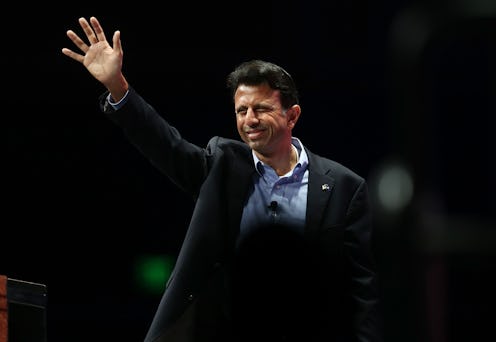News
Why Did Bobby Jindal Drop Out?
In an interview with Fox News Tuesday, Lousiana Gov. Bobby Jindal said that he would be suspending his 2016 presidential campaign, explaining that it was "not [his] time." Jindal first entered the Republican race in late June, but has been struggling to maintain recognition in the polls, especially over the past month or so. Aside from his low numbers, however, it was not immediately clear why Jindal had decided to drop out. But a closer look at the governor's finances and problems in his home state might tell a more comprehensive story.
"[My parents] raised me to believe Americans can do anything, and they were right, we can," Jindal wrote in a statement Tuesday. "But this is not my time, so I am suspending my campaign for President."
Jindal's critics pointed to the now-former candidate's troubled financial coffers as a possible motivator, citing third-quarter fundraising reports which showed the Louisiana governor's camp had just $261,000 in the bank. According to the official numbers, Jindal had managed to bring in just under $600,000 between July 1 and September 30, but had spent a whopping $832,000. That month, a Jindal spokeswoman denied that the campaign was in any serious trouble. "This is an election not an auction," wrote press secretary Shannon Dirmann in an email to The Hill. "We are running a lean mean campaign."
In contrast, Jindal’s rivals Ben Carson and Ted Cruz both reported massive third-quarter fundraising, topping $20.8 million and $12.2 million, respectively. Jindal’s funds seemed almost painful in comparison.
Compounding the matter were a slew of problems in Jindal’s home state of Louisiana. After a tight gubernatorial race over the past few months between Jindal’s potential successors, Republican Sen. David Vitter and Democratic State Rep. John Bel Edwards, the campaign devolved into all-out war when Vitter accused Edwards of bringing terrorists to Louisiana. Citing Edwards’ support of President Obama and the continued resettlement of Syrian refugees, Vitter declared that “no Syrian refugees would enter Louisiana” if he was elected governor.
The comments were familiar. In a statement on Monday, Jindal himself wrote that he had signed an order barring Syrian refugees from resettling in Louisiana. But despite the glossy promises, neither Jindal nor Vitter could actually assure citizens that their declarations could be carried out. According to State Department spokesman Mark Toner, banning refugees based on nationality could actually be unlawful. “I think our lawyers are looking into that,” said Toner in a statement to reporters on Monday.
The in-fighting didn’t stop there. In what Business Insider called “the most brutal attack ads in recent history,” Edwards lashed out out Vitter with a commercial which reminded voters that Vitter had been embroiled in the 2007 “D.C. Madam” scandal. Edwards’ team claimed that Vitter had “answered a prostitute's call minutes after he skipped a vote honoring 28 soldiers who gave their lives in defense of our freedom,” adding that Vitter had chosen “prostitutes over patriots.” For all intents and purposes, the gubernatorial race had become a political bloodbath.
How did this affect Jindal? It’s unclear whether the bickering added an extra layer of tension or not. Regardless, it probably didn’t help. Certainly, Vitter and Jindal themselves don’t exactly get along. Jindal failed to endorse Vitter in both his 2010 Senate run and the 2015 gubernatorial race; Vitter subsequently criticized Jindal’s out-of-state travel. And with the attacks beginning to mount heavily against Vitter, the two men’s chilly relationship likely doomed Jindal’s White House run long ago.
“If Vitter forfeits the governor's race … one reason for the loss will be the damage to the Louisiana Republican brand inflicted by eight years of Bobby Jindal,” The Times-Picayune’s Robert Mann explained in a column last week. “If Vitter is damaged goods, Jindal is toxic waste … and if Vitter loses [...] pundits in Louisiana and Washington will immediately blame him for some part of Vitter's loss.”
With the gubernatorial election just days away, it's looking more and more like Vitter will be buried beneath Edwards' landslide runoff win. And although it's unlikely that any of this played a large role in Jindal's decision Tuesday, there's no doubt that the issue was causing his camp to rethink its long-term strategy.
Taking into account his sordid home-state stressors, his financial woes, and the fact that the governor has regularly been relegated to the preliminary primary debates due to his low poll numbers (a recent aggregate put him at just 0.3 percent of the vote), it's no surprise that Jindal's team has decided to throw in the towel.
